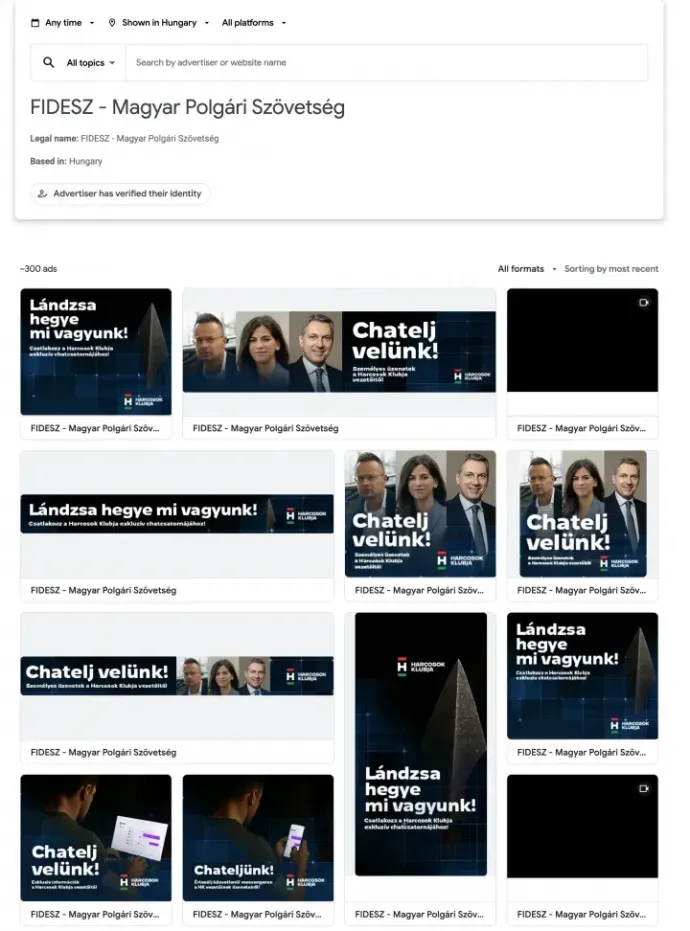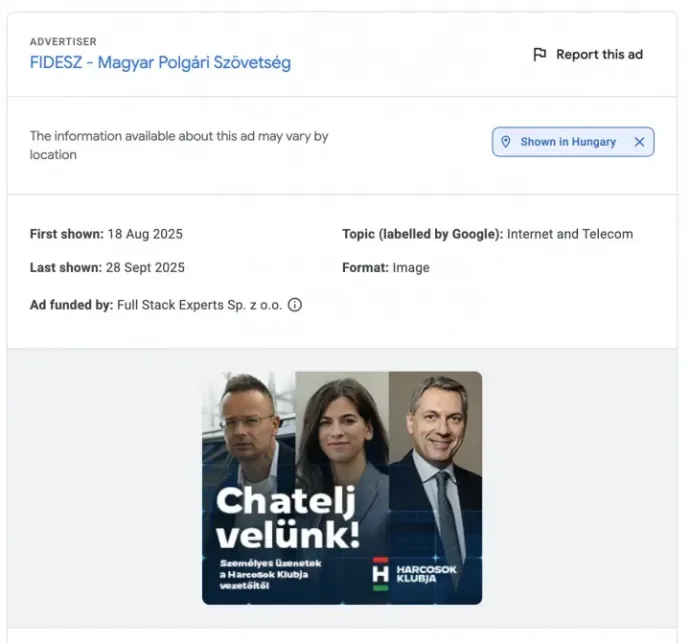Fidesz sneaks its political ads through Google's filters via Polish company
Google stopped allowing political ads in the EU on September 22, thus effectively depriving Fidesz of a campaign weapon they have spent billions of forints on in the past. However, it seems that this did not work without a hitch, as several of Fidesz's political ads have managed to slip through the filters since then.
But how are they doing it?
Although Google has discontinued its public database of political advertisements in the EU, it continues to maintain a transparency page for non-political advertisements, albeit one that is much less detailed. Here, it is clearly visible that Fidesz continues to bombard internet users with Fight Club ads, except that they are not labeled as political ads, but are instead categorized as corporate, internet, and telecommunications ads. The most interesting detail is that according to the database, it is not Fidesz that is paying for these advertising campaigns, but a Polish company called Full Stack Experts Sp. z o.o.

The ads are categorized by Google's system, so the mislabeling may simply be an error in the algorithm – but this still leaves the question of why Fidesz, while knowing full well that political advertising is not allowed, is still trying to do it, counting on the algorithm's clumsiness. However, the information on who is paying for a particular advertisement needs to be provided by the advertiser, which in this case is Fidesz – Hungarian Civic Alliance.
Full Stack Experts is a Polish company that provides consulting and various web-related services and is a partner in several Google programs. According to their own statement, they are a martech company, i.e., they deal with marketing technology.

We sent questions to the Polish company about the nature of their relationship with Fidesz and asked whether they are the ones paying for the ads, and if so, then why. We also asked for their opinion about a foreign company paying for the ads of another country’s governing party. We received the following response:
“Full Stack Experts is a martech technology reseller. Our function is to provide the technical infrastructure and advertising licenses to a wide range of agencies and advertisers globally.
FSE is not the advertiser. We are not responsible for the creation, content, or targeting of specific advertising campaigns, including those related to the Fidesz party.
Our presence as the listed "payer" in transparency reports is strictly a consequence of reselling advertising licenses and technical access to our dozens of corporate clients worldwide. We are solely a technology supplier.”
If, however, they are not the ones paying for the ads and are also not the ones creating the content, then it is not clear what the service the company provides is. We sent an additional question about this, as at this point, it seems that the service provided is simply to ensure that it is not the name of Fidesz, i.e. a political party that is listed as the one financing the ads, as that is something the algorithm would catch.
In response to our inquiry, the company explained in detail how they operate. They sell access to several different marketing tools, acting as a kind of intermediary. One such tool is the Display & Video 360 (DV360) platform, which is owned by Google and can be used to automate the purchase of online advertising space. According to CEO Aneta Mondry, their pertinent business model looks like this:
- A client (such as an advertising agency or an advertiser) signs a contract with FSE in order to gain access to DV360.
- The client then runs their campaign independently and pays FSE for the service based on monthly data.
- FSE then forwards the payment for the ads and platform usage to Google.
Thus, although FSE is not actually financing the ads, since they are the last ones to make the payment to Google, their name is the one that appears in the database as the one who made the payment.
“Officially, we are an intermediary for payments, not the initiator or the one actually financing the campaign,”
Mondry wrote, underlining that they are not helping Fidesz circumvent Google's new rules on political ads, but are only providing access to a technology. As an example, she argued that if someone buys a TV and shows 16+ content to young children on it, the electronics store where the TV was purchased is not the one responsible.
We also contacted Fidesz about this. We asked the party for their opinion on why Google listed their ads in the category it did, what their relationship with the Polish company is, and whether it counts as foreign interference for a Polish company to pay for the ads of a Hungarian political party. We asked the Sovereignty Protection Office for their opinion on this, as well as whether they intend to launch an investigation on the matter.
We also contacted Google to find out why they failed to recognize political ads. We were also curious to have their opinion on the fact that the whole affair looks as if one of their Polish partners was helping someone cheat their system. We have not received a substantive response from either party, but if we do, we will be sure to inform our readers about it.
For more quick, accurate and impartial news from and about Hungary, subscribe to the Telex English newsletter!